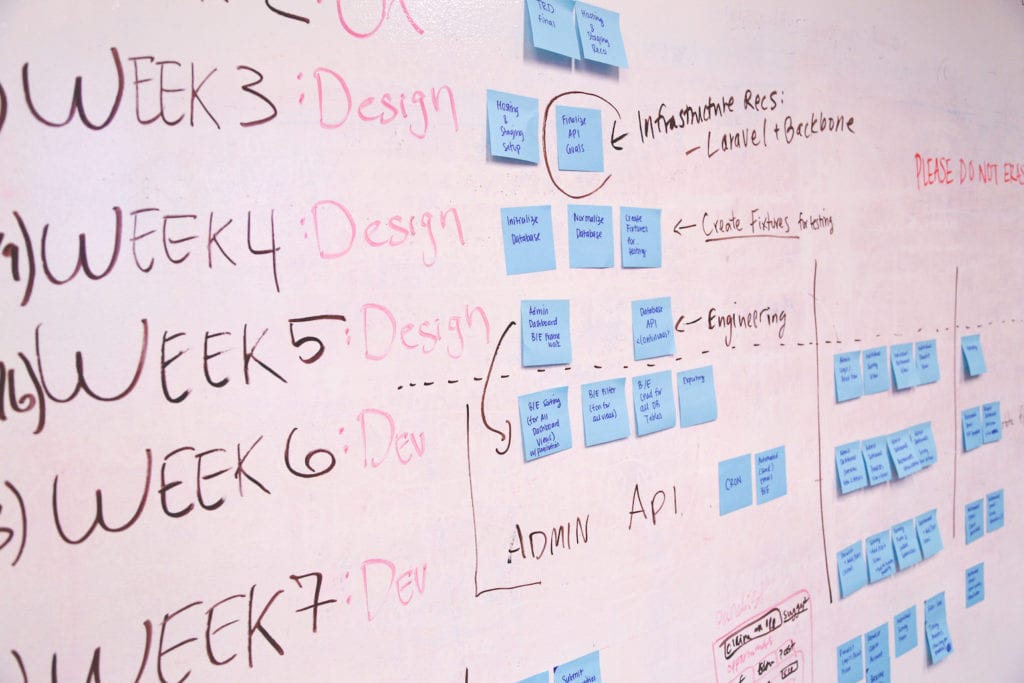Product management is a career topic near and dear to Learn to Code With Me, since I (Laurence) worked in that field for several years!
As you’ll read below, it’s a great job to have if you like variety in your workday, since there’s no one “product manager definition” and it’s often somewhat of a jack-of-all-trades role.
In this special guest post, I’m pleased to welcome product management thought leader Stephen Cognetta, who used to be a product manager at Google before co-founding the career-prep tool Exponent. He writes about what product managers do, important product manager skills, resources to explore how to become a product manager, and more.
🎤 Here’s Stephen!
Disclosure: I’m a proud affiliate for some of the resources mentioned in this article. If you buy a product through my links on this page, I may get a small commission for referring you. Thanks!
Table of Contents
- What Is a Product Manager?
- Average Product Manager Salary
- What Does a Product Manager Do?
- Next Steps to Learn Product Management
What Is a Product Manager?
Product management (PM) is one of the hottest jobs in the market right now, especially with its integral and versatile role as a nexus point in most growing tech organizations. However, product management is so versatile that it’s challenging to define.
So, what actually is a product manager? A product manager, put simply, is responsible for developing and delivering excellent products. At the end of the day, the product manager owns and is responsible for the full product development cycle, from inception to launch.

In practice, this means that product managers are less skill-focused and more cross-functional in nature, often working with a variety of teams across different disciplines to launch an excellent product. Product managers often advocate for the user, always thinking about how people will perceive and consume the product experience.
To better understand the overall picture of what product management is, we’ll spend most of this article looking at the different teams a product manager works with.
Head back to the table of contents »
Average Product Manager Salary
Before we get into the job duties, let’s talk money real quick. Is it a good career field financially speaking? How much does a product manager make?
While it really depends on the specific company and area you’re working in, the overall national average salary on Glassdoor for a product manager was almost $109,000. When the average is six figures, it does make it a lucrative career option!
💰 Breaking it down a little further:
- Associate product managers (who usually work under product managers) make an average of $96,000
- Senior product managers (another level up) make an average of almost $124,000
- Directors of product management (usually the highest level) earn an average of $149,000
So, it’s a career that generally starts out paying well and also offers room for growth. Win-win.
Head back to the table of contents »
Join the free portfolio course
Sign up below for my *free* course on how to build a portfolio site as a web developer/designer.
What Does a Product Manager Do?
Since the core of most product management jobs is working with different teams, let’s dive into what that can look like. Keep in mind that depending on the company and the stage of the product, a product manager may have more or less of the following duties.
💻 Working with Engineering
The engineering team is one of the closest and most essential teams to a product manager. Ultimately, engineers are responsible for building the product, so it’s a natural partnership. Product managers often conduct regular meetings with the engineering team to help shape priorities, set the product vision for the product, and navigate technical constraints.
To work with engineers, product managers need to understand the technical architecture of the product, so they can shape the vision and development of the product in a way that aligns with the company’s vision and the end-users’ needs.
The most common conversations with product managers and engineers involve prioritization. Most tech products have tons of features and bugs, so it’s up to the product manager to decide which ones are most important to address first.
Example: An engineer is struggling with deciding whether or not to introduce a paywall for the platform in the initial launch, and estimates it will take two extra weeks to develop. As a product manager, how do you help guide this decision? Can you help reduce the time it takes for an engineer to develop the feature? Is this feature necessary for launch?

Head back to the table of contents »
Start coding now
Stop waiting and start learning! Get my 10 tips on teaching yourself how to code.
🎨 Understanding Design
Product managers will often work with interaction designers and user experience (UX) designers to bring a product idea to life. The most common product management “trio” is an engineer, a product manager, and a designer. In these meetings, product managers will facilitate agreements on technical constraints and design decisions in the group.
Generally, in the earlier stages of a product development lifecycle, product managers work more closely with designers to communicate user research, business goals, and technical constraints that inform the product designs.
Product managers succeed in working with design when they can understand and discuss design decisions, without necessarily needing to know how to design things themselves. Product managers often create rough sketches with wireframing tools like Balsamiq which the designer can then take and create a higher-fidelity version.
Example: A designer is creating a new online course platform, and wants the videos to auto-play. However, the engineering team mentions this won’t work across all browsers. How would you find a good solution?
Head back to the table of contents »
👩💼 Navigating Leadership
One of the most challenging and rewarding aspects of product management is how closely it is tied to the company’s leadership. Ultimately, the leaders of the company look to product managers to shape the direction of the product’s development. This means product managers often present in executive meetings about their latest product updates and negotiate constraints with stakeholders.
Stakeholder management is critical to a successful product manager. Product managers must navigate various opinions and priorities from the different teams they work with. Often, a product manager focuses on getting “buy-in” from the different teams and leadership on a specific direction for the product, informed by user research and data analysis.
Example: Leadership is hesitant to develop features to target users in a new region. How can you convince and persuade them (with data and research) that this new region is a high-impact one to focus on?

Head back to the table of contents »
📈 Working With Data
One of the biggest contributions a product manager brings to their team is a deep understanding of the user experience. Ultimately, product managers need to advocate for the user’s perspective — and one incredibly effective way to do so is to understand how to read and analyze data. Product managers will often dig deep into product and user data to validate hypotheses and inform the direction of the product.
Basic product manager skills in this realm include SQL analysis, data visualization, and communicating with data. One of the more common projects a product manager will work on is an A/B test — where two versions of a product experience are sent to two different subsets of users. These tests help product managers validate their product decisions and influence stakeholders’ opinions.
Example: You’ve recently run an A/B test to see if a red or blue background drives more purchases of the product. How would you dig into the data to come to a conclusion about what the right decision is for the product?
Head back to the table of contents »
🔍 Conducting User Research
While data is one way to understand users, sometimes it doesn’t have the full picture. User research (the act of interviewing and asking users about their product experience) can be an incredibly effective tool for product managers to empathize with users and improve product decisions.
Product managers will partner with user researchers to define questions and goals for the user research sessions. After the sessions are complete, PMs will work with the user researchers to synthesize conclusions and observations that will then inform the product direction.

Equipped with knowledge from user research and data analysis, product managers then can help prioritize features and bugs for the engineering team.
Example: You’re not sure if the product you’re developing is easy to use, as you’ve seen a lot of users drop off at the sign-up stage. What questions can you ask customers to understand why they’re dropping off? Are there key flows you’d like to watch users go through?
Head back to the table of contents »
📊 Partnering with Marketing
Product managers work with product marketing managers to help bring users to the product experience they built. Sometimes, there may be marketing goals or campaigns that involve product decisions — for instance, maybe a product should have a holiday theme to tie to a holiday promotion the marketing team is working on. Product managers can work together with marketers to prioritize these product changes, and guide marketing on how to best advertise the product experience.
Example: The marketing team wants to add a promotion to the homepage, featuring the company’s latest new product. Where should this promotion go on the page? How can we ensure it won’t cannibalize sales from other products on the page?

Head back to the table of contents »
👔 Owning Project Management
Often, product managers will work with project managers or program managers at the company, who focus on helping teams execute their goals. Product managers will often also need to co-own the project management of the team, by helping to set deadlines and milestones and communicating across the team. Product management is often about the “why” while project management is about the “how.”

Some common skills product managers leverage for project management tasks include task scheduling, running the meeting agenda, and defining success criteria. Examples include deciding whether or not a launch date needs to be moved or advocating for more resources for a team.
Confused about product managers vs. program managers? Read more about the differences between product and program managers.
Example: The team has been blocked on a feature for an extra week than intended. How does this affect the launch plan for next week? What aspects of the team’s development do we need to accelerate? Decelerate?
Head back to the table of contents »
Next Steps to Learn Product Management
While this isn’t a complete list of all the teams a product manager will work with, this article at least paints a picture of how versatile and diverse product manager jobs can be.
If you’re interested in learning how to become a product manager, check out the further reading below!
🌟 Resources to learn more:
- What it takes to be a great PM
- The ultimate guide to product management
- Software engineering vs. product management
For career-prep and interview help specifically created for product manager jobs, sign up for an Exponent membership here with a special LTCWM discount! Sharpen your interview chops with a collection of interview prep courses covering questions on topics like product design, product strategy, technical product manager questions, and more.
Membership also gives you access to 1-on-1 mock interviews, a Slack discussion community, an interview question database, and help from the experts.
Since product managers have to wear so many different hats, it pays to be prepared to answer questions in a variety of areas. When you’re ready to start your product management career, Exponent is here to help.
About the author

Stephen is CEO and co-founder of Exponent. He is a product management thought leader who has presented at Google, WeWork, Stanford GSB, Duke, Yale and more. Previously, Stephen was a product manager at Google.

